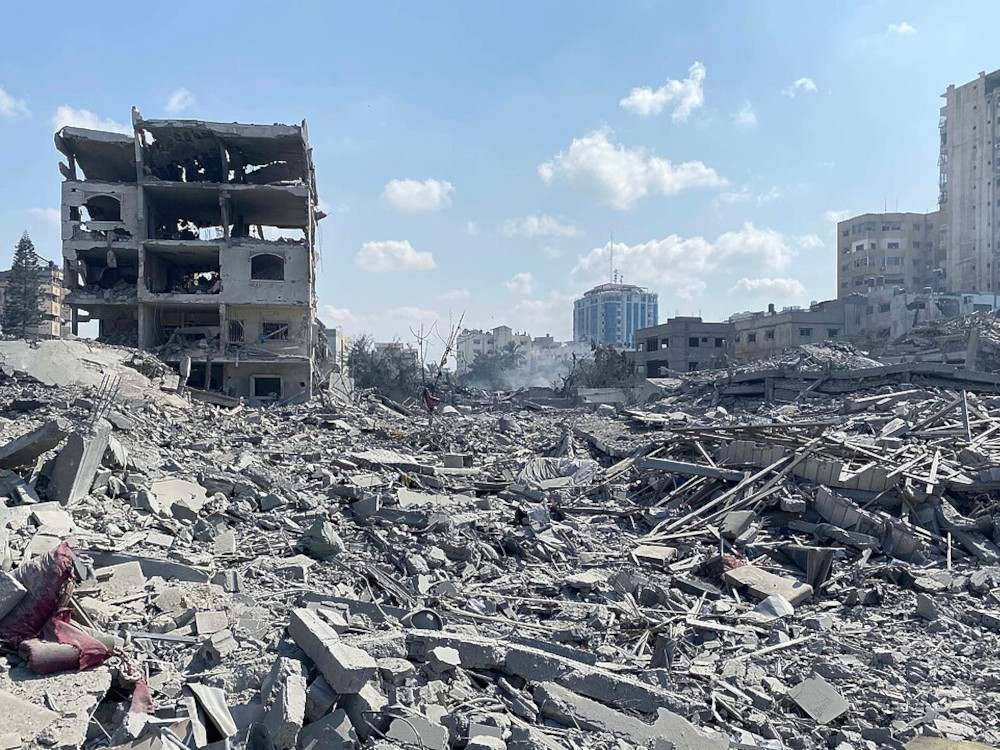It is such a “scary conversation” that Haviv Rettig Gur, senior analyst for the Times of Israel, debated for weeks before recording a podcast. The topic? Do Israelis care about the suffering of Gazans, where the death toll of over 25,000 includes over 10,000 children, according to Hamas Health Ministry figures? (According to some Israeli sources, the overall figure is credible and realistic.) The Times of Israel is currently the world’s fastest-growing news website – as the most independent news source from that side of the conflict.
Gur rightly points out that some Western reaction “reeks of hypocrisy” – he cites the 85,000 children of Yemen killed in the civil war in Yemen that hardly get noticed. But he comes up with a surprising proposal. (In this piece, I will focus on his proposal, not the war in general.)
Amanda Borschel-Dan, the Times of Israel podcast host, and Gur analyse a situation in which the attention of the Israeli Media is on the deaths of Soldiers in the IDF but insist the Israeli public is aware of the suffering in Gaza through social media. “Nothing is hidden,” says Gur. “No matter what the editors of Channel Twelve’s nightly news try to say, do, or decide. And so, no, I do think Israelis see all of it.
“The mainstream Hebrew language news has much, much, much less of it than what the world is looking at and certainly than what the Arab world is looking at. And each of these, I think is an order of magnitude difference. And so it’s a huge gap, but they know in great detail.”
(Keshet 12 is Israel’s most-watched commercial TV channel.)
Borschel-Dan and Gur both consider that Israel had no choice to retaliate, but Gur suggests Hamas committed two atrocities: “October 7 is an atrocity committed against us, and then it is an order of magnitude, larger atrocity order of magnitude, at least mathematically in terms of death toll that they committed against Gaza’s civilian population because we were not able then to not go after them and to uproot them.” But that, rightly or wrongly, is mainstream Israel opinion, not a surprise in the broader discussion.
With Haviv Rettig Gur, one has to listen further as he carefully acknowledges where his audience – local and diaspora Jews mostly sit.
Gur spent last week in London talking to “Friends of Israel.” They raised a suggestion that Gur has resisted for weeks, which he now sees the sense of. “They understand that the bad guys are the reason there’s the humanitarian crisis and not the good guys. But then they said to me things like, ‘But you don’t look like you care. And that makes it awfully hard to stand up in parliament and say, you do. You don’t look like it matters to you that there’s going to be hunger in Gaza, and that makes it awfully hard to sit in think tanks or debates or go on the BBC and say that you do.’
“‘Why isn’t Israel taking a brigadier general?’ A friend of Israel asked me this question almost in these words: giving that brigadier general whatever they needed to get the job done: soldiers, tents and in Gaza, creating a humanitarian area under Israeli control, filtered with Israelis, making sure the Hamas doesn’t get in.
“Now, Hamas is definitely going to get in, and Hamas is going to attack the place, and they’re going to be terror attacks there. Well, that looks good for Israel if there’s a Hamas terror attack against an Israeli, a massive Israeli humanitarian aid operation.
“Israel can speak Arabic. They’re 20% of our population are Arabs, many of whom call themselves Palestinian. They have many identities all at once, but Palestinian is a big part of their identity. They could be central to this effort. They identify with a state more than ever because Hamas really made Palestinian politics look pretty awful to Israel’s Arab population.
“{Gur’s interlocutors say,] ‘Build out a humanitarian aid system that not only shows that you care, but that shows that this is your priority.’
“And I try to explain that that’s really not the focus [within Israel]. Our government has political problems doing it. Netanyahu can’t look too friendly to the civilian population in Gaza because he has to worry about [right-wing leader and Cabinet minister] Ben Gvir the day after
“This is not an excuse, but it’s a reason. It’s just a diagnostic reason, and I tried to explain that there are these problems, and then the response was, I think, very deep, very serious, and really drove home a major part of the problem with this war not having a future horizon. The answer was ‘Hamas can lose everything in Gaza and still win, and [Hamas leader Yahyar] Sinwar can become a Saladin if the humanitarian crisis gets bad enough or is perceived to be bad enough in the Arab world that it cuts off Israeli relations with the Arab world for ten years.
“If we’re at the beginning of that humanitarian crisis, there’s no telling where it’s going to go.”
Setting aside all “moral” considerations, Gur goes on to make the point that for Israel to respond with a massive humanitarian effort in Gaza will give cover to Biden and other Democrats and British Labour MPs who have supported Israel. It will give Israel more time in Gaza. It will also provide the Gazans, whose support is much lower for Hamas than in the West Bank, the beginnings of a future.
But to aid the Gazans would be massively unpopular in Israel. Strong leaders in war need to do unpopular things, Gur notes, without mentioning Netanhayu. Friends of Israel are suggesting a move that is moral, practical and in Israel’s long-term interest.
Image: Palestinians inspect the damage following an Israeli airstrike on the El-Remal area in Gaza City on October 9, 2023, Source: Wafa Photo by Naaman Omar apaimages

